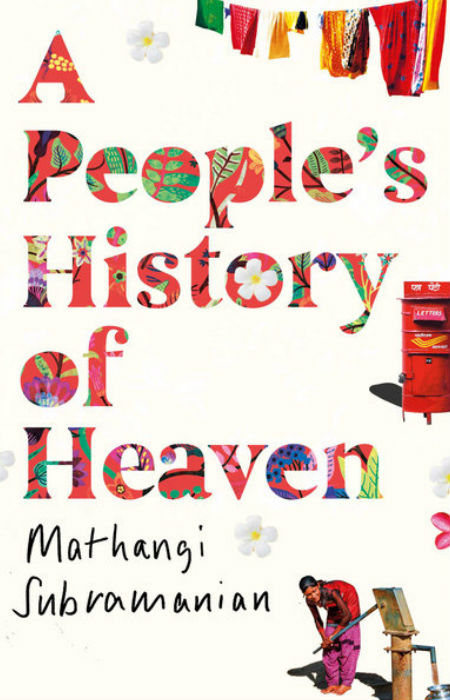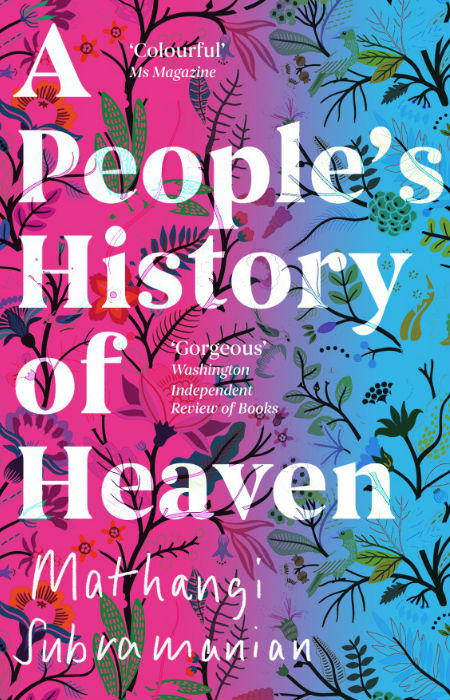
Life is often a heartbreakingly beautiful mix of the good and the bad, the joyful and the morose, the ugly and the poetic.
Life’s torturously contrary state of being is captured in all its tarnished glory by Mathangi Subramanian in her debut novel A People’s History of Heaven which centres on a group of families, mostly the women and girls, in the Bangalore (now Bengalaru) slum of Heaven.
The name is not some ironic nod to the less than perfect material lives of these women, a jaunty tilt of the head to the fact that the cobbled-together homes in which they live are often the exact opposite of the dwelling place of gods and angels.
The name at the front of the slum, which sits cheek-by-jowl with Bangalore’s rapid race to development (one full of malls and shiny glass office buildings), was originally “Swargahalli”, a Kannada word that means “the paradise” but was truncated to “Swarga” or heaven when the sign broke in days now long forgotten.
Heaven is now the name for a strip of tarp and corrugated iron and made from scraps homes that gather in a strip of land that the powers that be in the city think could be far more better used to accommodate India’s burgeoning middle class which, while ever increasing, cannot hope, yet anyway, to absorb all its clamouring aspirant members.
“OOOO”
Subramanian, an Indian-American author who previously published two YA novels including 2015’s Dear Mrs Naidu, captures life in the enclave in all its fragile, hopeful and yet despairing splendour, resisting the urge to romanticise the lives of its inhabitants, in favour of documenting the greta many, often unwilling, compromises they have made to be there.
For many of the women there, who have lost husbands to unfaithfulness, lack of interest or their own twisted versions of ambition, Heaven was meant to be a stopover, a place to gather their breath, some money and resources, before joining the rest of India on a race to a far more well-off future.
But life, especially in the heady climes of a rapidly-industrialising society, is rarely that inclusive of dreams and so the mothers of a tight band of friends – shy, talented artist Banu who finds learning a challenge, legally blind Deepa who shows a brilliance for most things she touches despite not being in school, Joy, a transgender girl who must fight doubly hard for her lot in life, Rukshana,a queer Muslim tomboy who bucks societal strictures at every turn and Padma, the daughter of a rural migrant family who excels at education – must do what they can to fashion a life in Heaven which is threatened with imminent demolition.
Many people might bound to the inevitable and the might and power of the forces arrayed against them but not the likes of Banu’s ajji or grandmother, the matriarch of Heaven, or Neelamma Aunty, Deepa’s mother or Joy’s Dalit (“Untouchables”) widowed mother Selvi Aunty, all of whom have fought hard to survive and are not giving up their home without a fight.

The narrative of A People’s History of Heaven is threaded in and around their standoff with the bulldozer drivers of Bangalore, who are men and cannot conceive of why you would fight for this sorry collection of homes before them.
If you were to assess Heaven purely on material terms you might agree, and many of the women, who hoped for much more, might be inclined to agree, but this is their home for better or worse, and like everything else in their lives, they will hold onto it with every last fibre of their beings.
Narrated by an unnamed member of the group of girls who deftly describes every girl, both good and bad points, capturing their ferocious love and loyalty for each other, and their sage understanding of their lot in life which they view in wholly unsentimental terms (there is no childish naivety at play here), the novel is a poetic tour de force, switching between the past and present to give us a brilliantly comprehensive look at what life means for people on the wrong side of the tracks.
All of them to a person long for more, but each are aware that life is rarely that kind or accommodating and that until their luck changes, and there is no guarantee of that, now or ever, they must make the best of things, seize every opportunity, such as the educational leg-ups offered by the fiercely supportive headmistress of Heaven’s school, Janaki Ma’am who understands all too well how much it takes to escape life in a slum, especially when you are a woman in a society geared almost entirely to fulfilling the aspirations of men.
“OOOO”
Bold in its willingness to tackle a range of issues including gender, religious and economic inequality – under the caste system, which has been outlawed legally but not in everyday life, the latter two things are inextricably yoked, A People’s History of Heaven never overreaches, biting off more than it can chew.
At every turn, it is considered, nuanced and honest, a book that is unflinching in its depiction of life in Heaven but which also celebrates the joy, the laughter and the hope that exists in the lives of these girls and their mothers, despite the muscular array of things that mitigate or outright cancel out their existence.
Told in language that is richly poetic and exquisitely beautiful, A People’s History of Heaven is a sumptuous delight that captures life in the slum in ways that are authentic and affecting, offering up a character study of a micro-society that wants for so much more but understands that getting it (if it ever happens at all) is far from certain.
This is life in modern India – the promise of riches and safety, independence and material wealth juxtaposed with the grinding reality that attitudes and social mores are lagging far behind the shift in overall prosperity, leaving many women and girls with the dream intact but its realisation fractured and broken though not without the prospect of healing and redemption and even possibly fulfillment.
The novel ends without offering a tidy wrap-up to proceedings but it does finish on a note of hope and triumph, saying that despite everything, and there is a lot standing in the way of their dreams and happiness, life is good in the present and might be even better in the future, and that while Heaven might not live up to its namesake, these women and girls (who you will grow to love) are not going to give up reaching for something better without a damn good, inspiringly-grounded fight.
